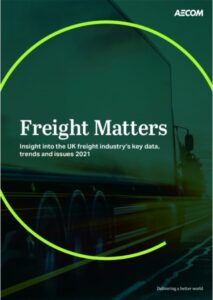The coronavirus pandemic and Brexit are having lasting impacts on the UK freight and logistics industry, according to the latest edition of AECOM’s annual Freight Matters report, in which industry experts share insights and data from an exceptional year.
Throughout 2021, the UK freight industry has remained in the national spotlight. The lasting impacts of the coronavirus pandemic and Brexit have had considerable influences on the way the industry has evolved and developed, whilst other key bearings such as the lasting commercial vehicle driver shortage and the UK ‘fuel crisis’ have considerably affected the way the sector has operated as well as how it is perceived by the wider public, writes Rai Sharma, AECOM’s Principal Consultant.
 Especially in the context of COP 26 and the signing of the Glasgow Climate Pact, the decarbonisation of all freight modes and the chartering of a path to net-zero continues to be a priority for all modes. Some modes are closer than others – and effective strategies such as appropriate modal shift and the greater prevalence of alternative vehicles are all important tools in the armoury for the freight and logistics sector.
Especially in the context of COP 26 and the signing of the Glasgow Climate Pact, the decarbonisation of all freight modes and the chartering of a path to net-zero continues to be a priority for all modes. Some modes are closer than others – and effective strategies such as appropriate modal shift and the greater prevalence of alternative vehicles are all important tools in the armoury for the freight and logistics sector.
AECOM’s annual Freight Matters report discusses these pressing challenges and brings together the latest, and most critical, high-level industry data for road, rail, water and air freight transport from a range of credible sources, alongside expert insight from AECOM’s freight and fleet specialists.
The report is of value to those working in the freight industry, involved in freight activity and/or interested in the sector’s growing contribution to the UK economy. It can be used to help inform decision-making, policies and projects. Insights include:
Coronavirus
By stepping up to ensure the continuous movement of goods in the face of changing demand, the freight and logistics industry has played a hugely important role in the response to the challenges presented by coronavirus.
As the UK and many other countries have a better grip on the pandemic, there is an expectation that the industry will return to pre-pandemic normality (or close to it). Our report considers that it may be better for the industry to examine the potential opportunities that coronavirus has opened up and looks at how these could be highly beneficial if taken.
Post-Brexit
Brexit has dominated political discourse for some time and continues to do so as the UK transitions from a paid-up full member of the European Union to a future as an independent trading nation. This has created the need to consider trading patterns, both with Europe and the rest of the world, and how these changes may affect supply chains.
With so many questions remaining unanswered regarding the future of freight and logistics in the UK, we call for a national freight strategy that reflects these challenges and opportunities and helps put in place the infrastructure required to facilitate new trading relationships. We also call on policy makers to support the efforts of the freight sector, and the vital role it plays, by providing the infrastructure and skills needed to do this effectively.
https://publications.aecom.com/media/files/aecom_freight-matters_2021.pdf















